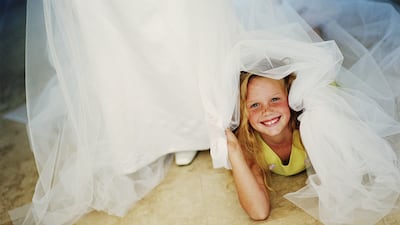The day of your wedding is one of the most special experiences of your life. But how far would you go to make sure it’s perfect?
Last month, bride-to-be Jasmine Cruz went viral on TikTok after sharing a strict list of wedding rules, which included no children, no guests in white and no big announcements. A chat with UAE wedding planners reveals ceremony rules are becoming increasingly popular, and demands increasingly varied.
Industrious bridesmaids, emotional groom
PR executive Ria Tharakan is one such blushing bride-to-be from Dubai who has set out a list of regulations that extends to not only her guests, but also the bridal party, family members and groom.
“My sister can’t be pregnant, there’s a strict dress code and the groom has to cry,” says Tharakan, 27, who is getting married in July.
“I may sound like a bridezilla, but bridesmaids do not get to sit and look pretty,” she says. “The requirement is to hold my dress, give the most emotional speech, capture my fiance’s expression moments before I walk down the aisle and tell me how pretty I look.”
Tharakan’s wedding day dos and don’ts also cover her guests’ outfits, with “harsh punishments” for those who fail to comply with the dress code.
“I have had my wedding planned since I was 5, and one of the things that excited me was the colour scheme for the event I would have one day,” she says.
“I have warned my guests that failing to comply with the dress code may result in them getting stopped from entering the ceremony." She says that if anyone comes overdressed, they’ll be getting a cover-up.
'No ring, no bring'
For Tharakan, the guest list itself is crucial, with only married or engaged partners allowed to attend with and as a plus one.
“At my wedding, there will be a no-ring, no-bring rule,” she says. “I was a bridesmaid at my sister’s wedding last year and I saw how tricky it was when people dropped out at the last minute.”
bride-to-be
Zainab Alsalih, managing director of Carousel Events, says more couples are tightening their guest lists. “Often, couples give out entry cards that guests have to show to security on the door to be allowed in,” she says.
“When you’re paying for every person who attends your wedding, you don’t want to be faced with a room full of strangers. A wedding ceremony is an intimate affair, and this way people aren’t just showing up for a free party.”
British bride-to-be Jemma Smith put together FAQs as part of her wedding invitation, which clearly stipulated her plus-one rules. “While we have invited a handful of friend’s partners that we don't know that well, we’ve kept it to anyone who's in an established relationship,” she says.
“[That way] we don't walk into a room full of strangers. The wedding has been hard to save for as it is, without paying for every Tom, Dick and Harry.”
No room for tears and tantrums

Smith's tightened guest list extends to children and, like TikToker Cruz, she has banned most offspring from attending the nuptials.
“We're overdue a good party with our pals, and having little ones there makes it a bit trickier throughout the day, especially since it's a really long day for kids,” says Smith. “The only exception is our nieces and nephews.”
bride-to-be
Wedding planners Rasha Badran and Donna Faddul, who run the events company The Purple Chair, say it is not unusual for children to be banned from modern-day wedding ceremonies. “We had a bride who had a big fight with a family member who wanted to disrupt the wedding decor with a high chair for her baby,” says Badran.
Faddul says: “Toddler tantrums and crying babies can cause chaos, and couples can do without the stress.”
The no-children sentiment is fully supported by Dubai bride-to-be Emma Patterson. “We don’t have kids ourselves and we’re at capacity with the venue already,” says the senior communications manager.
“Many of our friends have two to three children, so it would end up as an entire table taken with just two families. We also want it to be a proper party without people worrying about getting the kids to bed.”
Step away from the phone
Patterson is drawing the line at mobile phones, too. “I’m saying no photos during the ceremony because otherwise you just see a sea of phones and no one is actually paying attention to what’s happening,” she says.
She’s not alone. Alsalih says more couples than ever before are banning the congregation from taking their phones into ceremonies, much to the chagrin of snap-happy guests.
“A lot of couples ask for phones to be confiscated on arrival to stop people live-streaming the ceremony on social media,” she says. “But people can get very upset about having their phone taken away from them, so we get a lot of resistance. I once got slapped on the hand for telling one guest she couldn’t take her phone inside.”
Couples are getting increasingly inventive when it comes to dealing with the no-phones rule, says Badran. “There’s a new service that has become popular that blocks the camera from your mobile phone, but leaves everything else functioning as usual,” she says.
“It’s really frustrating when a big moment is interrupted by people waving their mobile phones around, especially when the bride is walking down the aisle and someone shoves a camera in her face.”
Honesty is the best policy
For Badran, the best way to approach wedding day rules is to be honest from the outset, though there are some non-confrontational methods that she prefers.
event manager
“A good way to share your intentions is through a personalised wedding website,” she says. “That way there’s no awkward conversations and no confusion.”
In Alsalih’s opinion, it’s best not to beat around the bush. “If you have wedding rules, then just come out with them. Be polite but firm — this is your day, these are your rules.
“If people have a problem with them, they shouldn’t come in the first place.”

